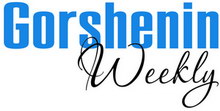Ukrainian business ready for work at Russian market – Experts[Over] 
The Gorhenin Institute held a round table discussion - Prospects for Ukrainian Business in Russia - on 8 February. Experts and businessmen discussed the most promising areas of cooperation for Russian and Ukrainian business.
President of UPEC Industrial Group Anatoliy Girshfeld considers that Ukrainian business has prospects in Russia in the knowledge-based industry sector while operations in raw material sectors may hampered with strong government regulation. ‘The government actively regulates the raw materials and associated industry sectors and it won’t loose it’s hands on it. This is the main source of the budget income’, - O.Girshfeld said. ‘The state of the knowledge-based industry is a common problem to the entire post-Soviet space. That is why Russia has to allow entering its markets the companies developing in the knowledge-based industry, even in strategic sectors,’ – A.Girshfeld said. READ MORE
- Thursday, 17 February 2011, 09:50
Viktor Yanukovych: Ukrainian Corrupt Officials are hiring foreign lobbyists[Over] 
ISSUE #04
02/15/2011
The President of Ukraine does not agree with the statements that the fight against corruption in Ukraine only targets the people that are in opposition to the current Government.
The Head of State says the corrupt individuals, trying to avoid responsibility, are using various lobbying groups in the country as well as overseas with the purpose of discrediting the actions of the Ukrainian authorities. The President reminded that everybody should be held responsible for corrupt acts regardless of what political party they belong to. READ MORE
- Thursday, 17 February 2011, 09:45
Bringing Russia into NATO: A Trojan horse in the making[Over] EGF Editorial
Is there any logic behind suggestions aired by senior decision makers, both past and present, that Russia could one day become a member of the North Atlantic Treaty Organisation (NATO)? At first glance, Russian membership to NATO may seem as a suggestion bordering on the absurd, given the history of relations between East (Russia/the Soviet Union) and West (the Euro-Atlantic bloc), as well as the fact that “Cold War warriors” are still in positions of power and influence on both sides of the former-Iron Curtain. That being said, the prospect of Moscow joining the NATO alliance has been implied publically by former-Russian presidents, Boris Yeltsin in 1991, Vladimir Putin in 2000, and by former-NATO Secretary-General, Lord Robertson, at a high level political conference in the Russian city of Yaroslavl just last September. READ MORE
- Thursday, 10 February 2011, 11:14
Ukrainians are not afraid of terrorist attacks – survey[Over] 
On January 24th through January 26th, 2011, Gorshenin Institute has conducted a phone survey "Explosions in Makeyevka". A total of 1000 respondents age 18 or older representing all 25 regional centers, Kiev and Sebastopol, were selected at random following a systematic procedure aimed at filling sex, age and community quotas. The margin of error is no higher then +/-3.2%. Results of the survey conducted among the residents of Makeyevka are presented separately. READ MORE
- Friday, 4 February 2011, 05:02
EGF Turkey File[Over] January 2011
Key Points:
• The Nabucco pipeline received several pieces of good news in January, but there is little sign of any movement towards commencement of construction works. Further, Italy’s ENI has rejected any possible suggestions that Nabucco could merge with Russia’s South Stream.
• Turkish Prime Minister, Recep Erdogan, has responded to criticisms that new laws advocating the restrictions of alcohol reflect an infringement on personal freedoms of Turkish citizens.
• The widely discussed “conspiracy” of the Sledgehammer coup plot is once again in the lime light, as prosecutors allege plans by the plotters to bomb two Istanbul mosques.
• Following the release of 5 members of the banned (Turkish) Hizbullah organisation in January, a fiery security- political debate has erupted as to whether there is a link between the AKP government and the outlawed group.
• While Istanbul hosts talks between the P5 +1 and Iran over the latter’s nuclear ambitions, Turkey sits out the meeting. A settlement on Cyprus appears impossible after Turkey and the EU sit out January talks in Geneva, with some critics saying this is the end for Turkey’s own EU accession negotiations.
• A day after Saudi Arabia halted its efforts in support of the formation of a new government in Lebanon, the joint Turkish/Qatari mission followed suit, claiming that the disputing Lebanese factions indicated reservations with external proposals to help broker a deal. READ MORE
- Friday, 4 February 2011, 05:01
EGF Turkey File[Over] December 2010
Key positions:
• In recent months Turkey has witnessed harsh prison sentences and threats of litigation by Turkish authorities in response to Kurdish protests and unfavourable press respectively in the past months. This is a worrying sign in that after nearly a decade in power, AKP authorities have become just as reactionary as the military backed governments of previous decades, only this time with an Islamic tinge.
• At the NATO Lisbon Summit on November 19-20, Ankara claimed victory for swaying its allies away from designating Iran as the main threat facing the alliance with regards to a proposed missile defence system which NATO is currently considering. While Turkish government officials indicated prior to the conference that they would demand command and control of the system if based on their territory, in Lisbon, that decision was put off for future discussion.
• Wikileaks’ release of American diplomatic cables have detailed the gossip and personalities of leading AKP politicians, but offered little else that could be described as damaging.
• In regional energy developments, Russia and its energy subsidiary, Gazprom, have been opting for pragmatism over threats in recent months by signing deals throughout the region with Bulgaria, Serbia, and Ukraine in order to strengthen prospects of realising the South Stream gas pipeline. Brussels and Sofia, for their part, have reached an agreement on bank guarantees for Nabucco (the EU’s rival to South Stream). READ MORE
- Monday, 20 December 2010, 20:29
|
|